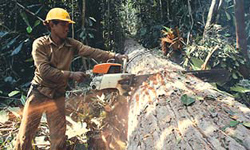Forests in danger in Papua New Guinea
Illegal logging is rampant in impoverished Papua New Guinea , fueled in part by corruption and the government's failure to enforce its own laws, a conservation group charged Wednesday. The U.S.-based Forest Trends said that a review of 14 logging concessions over 3.17 million hectares (7.83 million acres) in the mostly undeveloped country found that none could be defined as legal.

Most of the wood in the Pacific islands nation is being logged by Malaysian companies which are exporting it to China , Japan and South Korea , the group found. "Industry is allowed to ignore PNG laws and, in fact, gains preferential treatment in many cases, while the rural poor are left to suffer the social and environmental consequences of an industry that operates largely outside the regulatory system," the group said.
No one from the Papua New Guinea government could be reached for comment. The findings mirror the trends in some African countries and Indonesia , where international syndicates have teamed up with corrupt law enforcement officers to log vast portions of previously untouched rain forests.
Much of the wood goes to China , which needs the lumber to supply a fast-growing domestic market as well as an export industry that turns the logs into flooring and furniture for European and American markets. Forest Trends said Papua New Guinea has laws on the books to protect the forests, but the government largely ignores them, doing nothing to ensure logging is sustainable or prevent logs from being illegally exported.
It also has failed to act on the recommendations in its own reports on which Forest Trends based many of its conclusions, the group said. Profits from logging go into the pockets of the loggers and government coffers, with little going to poor local communities, it said.
"Basic rights of the landowners are being ignored, even abused," Forest Trend's Kerstin Canby said in a statement. "There are a few logging operations in the country which are deemed beneficial to both local landowners and the country, but they are lost in a sea of bad operators."
The group recommended the establishment of a fund to help communities fight illegal loggers in the courts while educating villagers about their land rights. It also called for a further investigation into corruption in the industry as well as links between logging companies and political groups. The environmental group Greenpeace, meanwhile, launched a campaign Tuesday in Papua New Guinea aimed at helping native populations define the borders of their land so they can better fend off illegal loggers.
Volunteers in the coming weeks will work with three tribes along Lake Murray in the country's west to chart out the borders of 300,000 hectares (740,000 acres) of land, the group said. "This new initiative is part of a global effort to protect the world's last ancient forests," Greenpeace's Asia Pacific Chief Executive Officer Steve Shallhorn said in a statement.
"Unless action like ours in Papua New Guinea is taken worldwide, vast numbers of species of plants and animals will become extinct, rainfall patterns will be disrupted and the global climate will change even faster than it is now," Shallhorn said, reports the AP.
N.U.
Subscribe to Pravda.Ru Telegram channel, Facebook, RSS!


